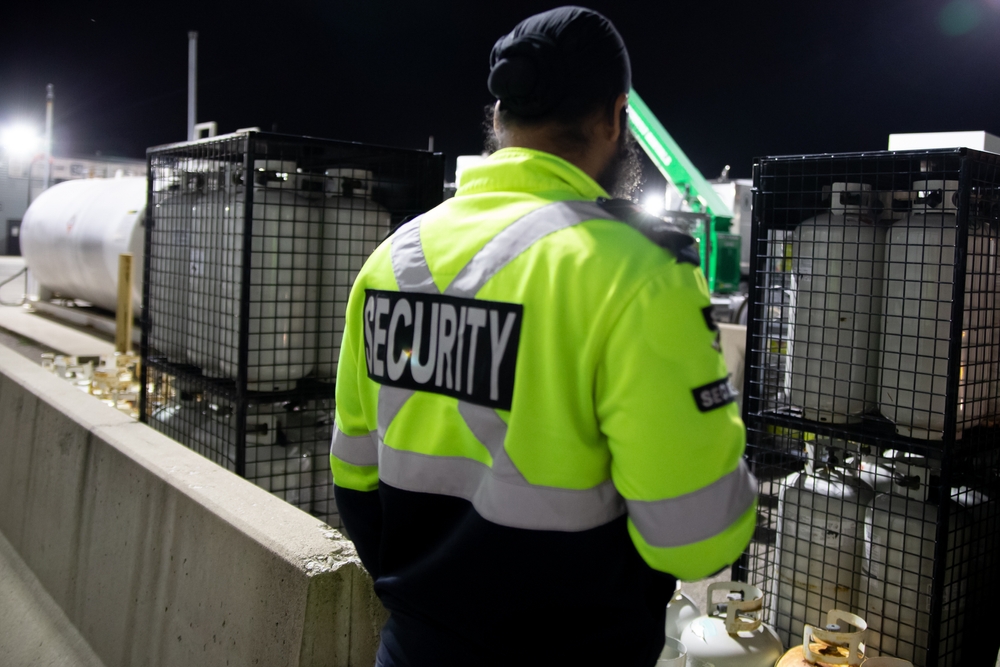
Securing Construction Sites: The Role of Security Guards
August 22, 2025 7:04 pm Leave your thoughtsConstruction sites are buzzing hubs of activity—and magnets for risk. With high-value materials, heavy equipment, and constant foot traffic, they’re vulnerable to theft, vandalism, and trespassing. That’s why construction site security guards are essential. Far more than a visible deterrent, a trained guard force creates structure, accountability, and rapid response capabilities that keep projects moving safely and on schedule.
Why Construction Sites Are Attractive Targets
From copper wire and catalytic converters to tools and fuel, the resale value of materials and equipment makes construction sites tempting. Add in multiple subcontractors, ever-changing layouts, and wide-open perimeters, and you’ve got a complex environment where it’s easy for bad actors—or even opportunistic insiders—to slip in and out. Vandalism and graffiti carry direct replacement costs and indirect costs like delays, insurance complications, and strained neighborhood relations.
Security guards reduce these risks by putting a human, real-time layer of protection at the center of your site’s security plan.
What Security Guards Bring That Cameras Alone Don’t
Cameras and sensors are vital, but they don’t stop a crime in the moment. Guards do. A professional on-site presence:
- Deters would-be thieves by being highly visible and proactive.
- Detects suspicious behavior early—before loss or damage occurs.
- Responds immediately to incidents, coordinating with law enforcement or site leadership.
- Documents everything, which streamlines insurance claims and internal investigations.
- Adapts as the site evolves, adjusting patrols and checkpoints with each build phase.
Technology is a force multiplier, but human judgment, communication, and accountability are the difference between watching something happen and stopping it.
The Guard’s Role Across the Build Lifecycle
Pre-Construction & Mobilization
- Perimeter planning: Collaborate with the GC to identify access points, staging areas, and blind spots.
- Vendor verification setup: Establish protocols for deliveries, tool check-ins, and visitor badges.
- Baseline inventory: Help document high-value items as they arrive to enable accurate tracking.
Active Construction
- Access control: Verify workers, vendors, and visitors; enforce sign-in/out policies; manage badges and wristbands.
- Patrols: Conduct randomized and scheduled patrols (interior and exterior) to avoid predictable patterns.
- Material protection: Monitor high-risk zones (e.g., electrical rooms, copper storage, fuel tanks).
- Traffic & safety support: Direct vehicles during peak hours and reinforce PPE and safety compliance at gates.
- Incident reporting: Log near-misses, suspicious behavior, and hazards in a standardized format.
After Hours & Weekends
- Lockdown checks: Confirm that tools, containers, and equipment are secured and immobilized.
- Alarm & video escalation: Serve as first response for alarms, verifying and escalating as needed.
- Weather response: When severe weather threatens, guards help secure tarps, fencing, and signage to prevent damage and liability.
How Guards Prevent Theft and Vandalism (In Practice)
Security wins aren’t just about catching someone in the act—they’re about reducing opportunity. Here’s how well-trained guards do it:
- Controlled access: A monitored gate with credential checks cuts unauthorized entries dramatically. Guards verify delivery manifests and subcontractor rosters, and they deny entry to unknown or unbadged individuals—even during chaotic rush periods.
- Tool and material tracking: Guards support foremen with check-in/out procedures for power tools and specialized equipment. A simple logged process (barcodes or RFID when available) reduces “mysterious disappearances.”
- Secured storage oversight: Guards confirm that high-theft items are locked in weatherproof containers or fenced compounds and that heavy assets are immobilized with booting or kill-switches at day’s end.
- Lighting and line-of-sight improvements: During patrols, guards identify poorly lit zones and recommend adjustments to floodlights, camera angles, and fencing to remove hiding spots and blind corners.
- Randomized patrol patterns: Predictability is the thief’s friend. Guards vary routes and timing, ensuring no easy windows for trespassers.
- Rapid law enforcement coordination: When something is off—fresh tire tracks, cut fencing, moved pallets—guards investigate, document, and call in help with the right details ready (descriptions, last-seen times, camera snapshots).
- Community liaison: Proactive guards de-escalate neighborhood concerns and gather useful intel (e.g., “suspicious pickup circling at 2 a.m.”), strengthening site awareness beyond the fence line.
Smart Tech + Trained Guards = Stronger Security
The most cost-effective programs blend people and technology:
- Cameras with analytics: Motion or AI analytics alert guards to unusual activity after hours.
- Alarms & sensors: Door, trailer, and tool crib sensors signal tampering in real time.
- RFID or QR asset tags: Make tracking and daily audits easier.
- GPS immobilizers: Disable equipment outside of approved hours or geofences.
- Digital post orders & reporting: Cloud-based systems time-stamp patrols, attach photos, and produce clean incident reports for stakeholders and insurers.
A reputable security company will tailor the tech stack to your budget and risk profile—never a one-size-fits-all approach.
Compliance, Documentation, and Insurance Benefits
Security measures aren’t just about defense—they’re also about proof. Consistent logs, incident reports, and chain-of-custody records help:
- Demonstrate due diligence to insurers and clients.
- Speed up claims by providing clear timelines, images, and witness statements.
- Satisfy contractual obligations that require security coverage or access control.
In many cases, a well-documented security plan can reduce insurance premiums or deductibles over time and minimize the financial sting of unavoidable losses.
Building a Right-Sized Security Plan
Every site is different. A downtown mid-rise has different vulnerabilities than a rural solar farm. Start with a quick risk assessment:
- Location factors: Crime rates, foot traffic, nearby businesses/housing, and lighting.
- Asset profile: Copper, tools, generators, fuel, HVAC units, specialized equipment.
- Perimeter realities: Fencing quality, gate count, shared lot lines, adjacent alleys or easements.
- Schedule & phases: Night work, weekend work, material drops, and critical path milestones.
- Stakeholders: Owner demands, GC requirements, insurer recommendations, and municipal rules.
From there, your security provider can recommend coverage tiers—for example: one gate guard during peak delivery hours, roving patrols after 5 p.m., and overnight coverage with alarm/video response.
What to Look For When Hiring Construction Site Security Services
Choosing the right partner determines your results. Consider:
- Construction experience: Ask for references from projects similar in size and scope (e.g., mixed-use, healthcare, industrial, infrastructure).
- Licensed, insured, and compliant: Verify state licensing, guard vetting, background checks, and training standards; request proof of insurance.
- Training depth: Look for training in access control, incident command, de-escalation, report writing, and OSHA awareness. Bonus: familiarity with equipment immobilization and tool crib procedures.
- Post orders & accountability: You want written, site-specific post orders and digital reporting with time-stamped patrols and photo documentation.
- Tech integration: Can they manage your cameras/alarms or provide a turnkey package? Do they offer recommendations to optimize lighting and fencing?
- Scalability & flexibility: As your build phases change, staffing should adapt without delays.
- Local knowledge: A team that understands Albuquerque, NM neighborhoods, traffic patterns, and first-responder protocols will respond faster and communicate better.
- Professionalism & culture: Guards are often the first and last people on site each day. You want courteous, reliable professionals who reinforce safety culture—not just check boxes.
Cost vs. Consequence: The Real ROI of Guards
Security might feel like a line item to minimize, but projects rarely regret investing in prevention. Consider:
- Direct loss avoidance: Replacing stolen copper or tools—and the delays that follow—often costs far more than a guard’s weekly coverage.
- Schedule protection: A single vandalism incident can push critical path milestones off by days, impacting penalties and labor scheduling.
- Safety & liability: Trespassers can get hurt; vandalized equipment can create hazards. Guards help reduce these risks dramatically.
- Reputation & client confidence: Visible, well-run security demonstrates professionalism to owners, neighbors, and inspectors alike.
FAQs
What are the primary duties of construction site security guards?
Construction site security guards control access, verify credentials, and document all entries and exits. They conduct random and scheduled patrols of perimeters, laydown yards, tool cribs, and high-value storage. Guards also monitor cameras and alarms, respond to incidents, assist with traffic control, and report hazards they observe—often helping enhance overall site safety. Critically, they create time-stamped logs and incident reports that support insurance claims and internal accountability.
How do security guards prevent theft and vandalism on construction sites?
They reduce opportunity and increase the risk to offenders. Tactically, guards enforce badge/band systems, verify delivery manifests, escort visitors, and secure containers and immobilize equipment after hours. Their randomized patrols make it hard for trespassers to predict coverage. Guards also optimize lighting and camera placement in collaboration with the GC, and they serve as first responders to alarms, coordinating with law enforcement when needed. The combination of visible presence, real-time response, and tight procedures is what stops crime before it starts.
What should you look for when hiring construction site security services?
Seek a provider with proven construction experience, proper licensing and insurance, and robust training in access control, de-escalation, incident reporting, and OSHA awareness. Insist on site-specific post orders, digital reporting, and the ability to integrate with cameras, alarms, and asset tracking. Prioritize firms with local expertise (knowledge of Albuquerque neighborhoods and responders) and a track record of scaling coverage as projects evolve. Professionalism matters—your guards should enhance safety culture and represent your project well.
Putting It All Together: A Practical Security Checklist
- Defined access points with guard coverage during active hours
- Badge or wristband system for workers and visitors
- Visitor escort policy and vendor verification at the gate
- Locked, well-lit storage for copper, tools, fuel, and HVAC units
- Equipment immobilization (boots, kill-switches, or geofencing) after hours
- Randomized patrols with interior and perimeter sweeps
- Cameras + analytics pointed at high-value areas and gates
- Alarm response plan with clear escalation steps
- Daily logs & photo documentation for accountability and insurance
- Regular reviews of post orders as the site evolves
When these pieces work together—people, process, and technology—losses go down, delays shrink, and everyone on site feels safer and more focused.
Why Choose a Local Partner in Albuquerque, NM
Working with a local, experienced team means faster response times, better coordination with area law enforcement, and practical knowledge of neighborhood patterns that out-of-town firms might miss. It also means smoother staffing, more consistent guard coverage, and managers who can visit your site to adapt post orders in real time.
Ready to Protect Your Project?
If you’re planning a new build or managing an active site in Albuquerque, NM, partner with a team that understands construction from the ground up. Advance On-Site Protection Security is a premier security guard company serving projects across the region with professional guards, responsive management, and tailored post orders that fit your site—not the other way around.
Contact us for more info by calling 505-897-1307. Let’s keep your timeline tight, your assets protected, and your team focused on the work that matters.
Categorised in: Construction Site Security
This post was written by admin
